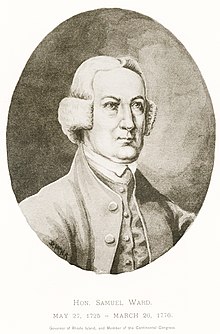Samuel Ward (American statesman)
| Samuel Ward | |
|---|---|

Samuel Ward
|
|
| 31st and 33rd Governor of the Colony of Rhode Island and Providence Plantations | |
|
In office 1762–1763 |
|
| Preceded by | Stephen Hopkins |
| Succeeded by | Stephen Hopkins |
|
In office 1765–1767 |
|
| Preceded by | Stephen Hopkins |
| Succeeded by | Stephen Hopkins |
| 7th Chief Justice of the Rhode Island Supreme Court | |
|
In office May 1761 – May 1762 |
|
| Preceded by | John Gardner |
| Succeeded by | Jeremiah Niles |
| Personal details | |
| Born | May 25, 1725 Newport, Rhode Island |
| Died |
March 26, 1776 (aged 50) Philadelphia, Pennsylvania |
| Resting place | Common Burying Ground, Newport |
| Spouse(s) | Anne Ray |
| Parents | Richard Ward, Mary Tillinghast |
| Occupation | Farmer, politician, chief justice, governor |
| Religion | Seventh Day Baptist |
Samuel Ward (May 25, 1725 – March 26, 1776) was an American farmer, politician, Supreme Court Justice, Governor of the Colony of Rhode Island and Providence Plantations, and a delegate to the Continental Congress. He was the son of earlier Rhode Island governor Richard Ward, was well educated, and grew up in a large Newport, Rhode Island family. After marrying, he and his wife received property in Westerly, Rhode Island from his father-in-law and, upon settling there, he took up farming. He entered politics as a fairly young man and soon took sides in the hard-money vs. paper-money controversy, favoring hard money, or specie. His primary rival over the money issue was Providence politician Stephen Hopkins, and the two men became bitter rivals, alternating as governors of the colony for several terms.
During this time of political activity, Ward became a founder and trustee of Rhode Island's first college, Brown University. The most contentious issue that he faced during his three years as governor involved the Stamp Act, which had been passed by the British Parliament just before he took office for the second time. The Stamp Act placed a tax on all official documents and newspapers, infuriating the American colonists by being done without their consent. Representatives of the colonies met to discuss the act but, when it came time for the colonial governors to take a position, Ward was the only one who stood firm against the act, threatening his position but bringing him recognition as a great patriot.
Ward's final term as governor ended in 1767, after which he retired to work on his farm in Westerly. However, he was called back into service in 1774 as a delegate to the Continental Congress. War was looming with the England, and to this end he devoted all of his energy. After hostilities began, Ward stated, "'Heaven save my country,' is my first, my last, and almost my only prayer." He died of smallpox during a meeting of the Congress in Philadelphia, slightly more than three months before the signing of the American Declaration of Independence, and was buried in a local cemetery. His remains were later re-interred in the Common Burying Ground in Newport.
...
Wikipedia
